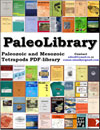
Complete Data Base of Paleozoic and Mesozoic Tetrapods.
Paleo-News and illustrations. Big electronic PDF-library.
| |
| PaleoNews |
| Classification |
| Books and Articles |
| Contact |
| Forum |
сайт о динозаврах
рейтинг сайтов
Free Counter
myspace hit counter
Paleo Profile: Sigilmassasaurus |
June 30 , 2016 by Carnoferox Genus: Sigilmassasaurus Species: S. brevicollis (Russell, 1996) Synonyms: Spinosaurus maroccanus (Russell, 1996) Classification: Dinosauria, Saurischia, Theropoda, Tetanurae, Megalosauroidea, Spinosauridae Distribution: Kem Kem Beds, Moroccco Bahariya Formation, Egypt Time Period: Lower Cenomanian (100-97 Ma), Cretaceous Size: Unknown due to incomplete remains Description: The first remains that can now be attributed to Sigilmassasaurus were described by German paleontologist Ernst Stromer in 1934. They consisted of fragmentary vertebrae and hindlimb bones found in the Bahariya Formation of Egypt. Stromer referred to the material only as “Spinosaurus B” because of its similarity to Spinosaurus, but also because he considered it a distinct species. The next fossils of Sigilmassasaurus were described in a 1996 paper by Dale Russell. These were isolated vertebrae collected from the Kem Kem Beds in Morocco. Russell named Sigilmassasaurus brevicollis for the Moroccan specimens. He also noticed similarities between “Spinosaurus B” and S. brevicollis, and assigned the “Spinosaurus B” material to Sigilmassasaurus sp. He placed both species in their own clade, the Sigilmassasauridae. In the same paper, Russell also described a second species of Spinosaurus from the Kem Kem Beds, Spinosaurus maroccanus. While Ibrahim et al. consider S. maroccanus to be synonymous with S. aeyptiacus, Evers et al. consider it to be synonymous with Sigilmassasaurus brevicollis. In a 1998 paper, Paul Sereno considered Sigilmassasaurus to be a junior synonym of Carcharodontosaurus, but later analyses have refuted this. In 2014, Nizar Ibrahim et al. designated the “Spinosaurus B” material as the neotype for Spinosaurus aegyptiacus, and included Sigilmassasaurus brevicollis and Spinosaurus maroccanus in S. aegyptiacus. Using the “Spinosaurus B” neotype and all other known S. aegyptiacus specimens as reference, Ibrahim created his controversial quadrapedal reconstruction of Spinosaurus. However, in 2015, Serjoscha Evers et al. rejected the “Spinosaurus B” neotype for S. aegyptiacus, and maintained that all material from S. brevicollis, “Spinosaurus B”, and S. maroccanus belonged to a single species, Sigilmassasaurus brevicollis. If “Spinosaurus B” does indeed belong to Sigilmassasaurus as a separate spinosaurid species, that has interesting implications for Ibrahim’s reconstruction of Spinosaurus. This would mean the reconstruction is based on material from two separate species, Sigilmassasarus and Spinosaurus, and therefore inaccurate. It also means that there were two coexisting genera of spinosaurids in Cenomanian North Africa, which greatly changes the dynamics of the paleoenvironment. Sources:
|
